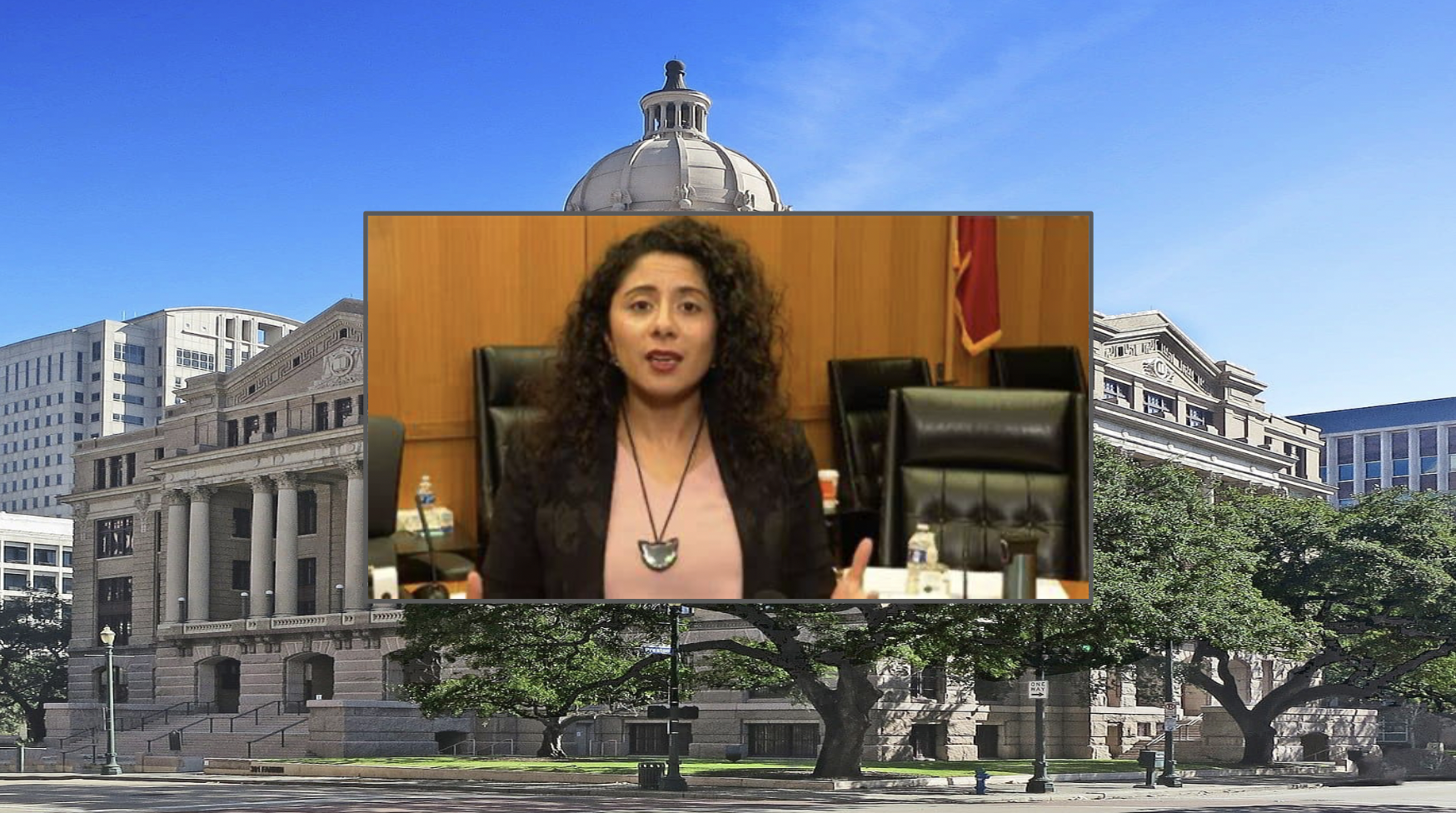An overflow crowd showed up at Collin County Commissioners Court on Monday for a public hearing about a proposed Islamic community known as EPIC City 2.0.
Dozens of citizens spoke. Almost all opposed the Muslim development, and county officials heard their concerns.
“I will not vote to support a project that violates Texas or federal law,” said County Judge Chris Hill following hours of public input. He concluded that based on available facts and feedback from constituents, “I cannot support this project.”
Hill clarified that commissioners had nothing to vote on during Monday’s meeting—and won’t for the foreseeable future, as the county has not received anything from the developers to consider or approve.
Plans for EPIC City were launched last year by the East Plano Islamic Center, also known as the EPIC Masjid.
The new EPIC community is being marketed as “more than just a neighborhood, it’s a way of life.” It’s designed to include 1,000 homes as well as a mosque, school, and other facilities catering to Muslim families.
Prospective residents purchased $80,000 “shares” to secure lots, becoming “accredited investors” in the 402-acre future community. According to EPIC’s marketing, EPIC City was so popular that the developers added more lots on nearby property dubbed EPIC Ranches.
At this point, marketing and empty farm land are about all there is to the EPIC developments.
Collin County Administrator Yoon Kim explained during Monday’s hearing that the EPIC City land is in an unincorporated area on the eastern edge of the county, just north of the city of Josephine.
That means planning will be the responsibility of county officials.
According to Kim, the county’s role is to ensure that the development complies with applicable state and county regulations.
He said the county can regulate plats and infrastructure, such as roads and utilities, but cannot regulate land use or residential density in the way that cities are authorized to manage zoning.
“When a plat comes to the county commissioners court, if it meets state and local laws, the county has a ministerial duty to approve it,” said Kim.
Kim said that as of Monday, the county had not received any application for development of the property from either EPIC or Community Capital Partners, an entity created by EPIC to manage the new project.
He also noted several ongoing investigations of EPIC and CCP instigated by Gov. Greg Abbott and Attorney General Ken Paxton in response to concerns that EPIC “may seek to incorporate elements of sharia law into its operations.”
The latest, announced by Abbott Tuesday morning, said the Texas Commission on Environmental Quality has determined that EPIC failed to obtain the necessary permits to begin construction on its controversial development in Collin County.
During public comments, county resident and conservative activist Brandon Burden described how offering property exclusively to Muslims would run afoul of the Fair Housing Act—a possible EPIC violation the state is investigating. He added that realtors could lose their licenses for discriminating against homebuyers on the basis of religion.
A common theme among many speakers at Monday’s hearing was how the proposed Muslim compound would serve to isolate rather than assimilate residents.
Melinda Preston told commissioners that EPIC City “does not align with the values that have long defined both Collin County and our nation.”
American values—freedom of speech, equal opportunity, individual responsibility, and respect for the rule of law—are not just buzzwords. They are the bedrock of strong communities. Any new development must embrace these principles, not sidestep them.
“These values are not negotiable,” she added. “We cannot afford to greenlight a project that undermines transparency, restricts diversity of thought, or imports systems of governance that are incompatible with our Constitution.”
EPIC City representatives confirmed to Judge Hill that the land has been acquired, even though the real estate broker’s website shows that the sale of the property is “pending.”
Representatives of Westwood Professional Services, who are providing engineering services to the developers, told commissioners they were still in the early stages of planning and did not have a timetable for when they might submit plans to the county for review.
CCP’s public relations consultant, Erin Ragsdale, said EPIC’s members “are proud to be Texans, they are proud to be Americans,” and they are excited to build a multigenerational community in Collin County.
Ragsdale told commissioners that EPIC City is “a master-planned community” that is “open to everyone.”
Hill said Ragsdale’s claim “appears to be inconsistent” with documents he and others had seen that marketed the community as an exclusive Islamic enclave.
“Can we achieve inclusivity by building a community based on exclusivity?” he asked.
Two speakers said they stood with the Muslim community and against religious discrimination.
Hill responded, “We agree on our dedication to the concept of liberty and our opposition to discrimination,” but the question is, “Who is discriminating against whom?”
Hill added that the issue is not freedom of religion.
“Freedom of religion is building a mosque. That’s not what this is about,” he said.
Commissioner Susan Fletcher, who was unable to attend the meeting, wrote in a statement on EPIC City, “As for me, this has nothing to do with opposing religious freedom in any way.”
“It’s also important to separate facts from fears, and there is still much to be learned on this particular development,” she added. “But make no mistake, if ANY group believes that they can try to circumvent existing American or Texas law under a false flag of religious freedom, they will find out very quickly that they are in Texas and it won’t be tolerated.”
Hill said county commissioners will hold more public meetings on EPIC’s development plans when they are submitted.
Ragsdale told Texas Scorecard on Tuesday that CCP “has been working with local and regional community leaders to discuss plans and receive input on a master planned family-centric community in Collin County” and had requested a meeting with Hill.
She said CCP declined to present on Monday “because the project is still in the early planning phase, and no plans have been submitted to the county.”
“We look forward to seeing how we can work together in the future,” she added. “That said, please recognize that CCP intends to follow all applicable rules, regulations and laws and intends to develop an inclusive community that all citizens can be proud of.”
Following Monday’s public hearing, Deputy County Administrator Russell Schaffner presented a legislative update and explained a proposed measure to address developments like EPIC City.
Schaffner said House Bill 4211 by State Rep. Candy Noble (R–Lucas) is “a very clever way of working through a number of concerns” regarding the EPIC development by creating a deceptive trade practice surrounding the agreements used to purchase and transfer interests in the community.
HB 4211 has been referred to a committee but is not yet scheduled for a hearing.
EPIC was established in Plano in 2003 and is among dozens of mosques and Islamic centers in Collin County and the Dallas-Fort Worth area.
According to resident scholar Yasir Qadhi, the East Plano Islamic Center is one of the most active and prestigious masjids in North America.
EPIC City 2.0 is one of several proposed new Islamic developments in Collin County, including Muslim-owned residential neighborhoods within the city of Blue Ridge, an expanded Islamic Center of Aubrey, and a new, larger mosque for the McKinney Islamic Association.
Recent data shows that more than 300,000 Muslims live in Texas.
No ads. No paywalls. No government grants. No corporate masters.
Just real news for real Texans.
Support Texas Scorecard to keep it that way!





